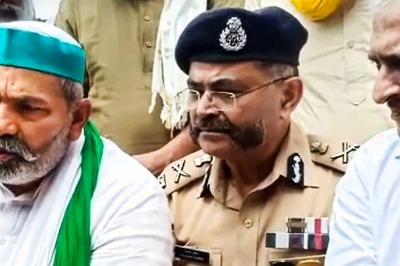
views
Prime Minister Narendra Modi has often invoked Socialist leader Ram Manohar Lohia on many occasions. He spoke about Lohia at an election rally earlier this year in Ayodhya, a constituency abutting Lohia’s birthplace, Akbarpur. Replying to the President’s address in his first speech in Parliament after winning general elections, Modi again spoke about Lohia’s politics.
A clear political pattern emerges out of Narendra Modi’s appreciation of Lohia. Through the appreciation, the prime minister seems to be providing political bulwark and arguments behind the BJP’s politics of anti-Congressism, which some in the party have articulated as attempts to create a ‘Congress-mukt Bharat’.
In one of his speeches, the prime minister said, “Due to Lohia’s efforts, one could travel on board the Howrah-Amritsar mail without having to pass a single Congress state. As we know, in spite of their differences, Ram Manohar Lohia-led Socialist Party and Jan Sangh worked for creating anti-Congress mobilisation in India during 1960s.”
Moreover, the prime minister in his oratory has made subtle use of Lohia to challenge Mandal parties in UP and Bihar that evolved out of the Janata Movement in the 70s. Both Samajwadi Party and RJD have socialist moorings, but have rendered themselves family corporations in a short span.
In invoking Lohia, Modi is challenging the social justice credentials of Samajwadi Party in Uttar Pradesh led by Mulayam Singh Yadav and Akhilesh Yadav, of the RJD led by Lalu Prasad Yadav and his son Tejashwi. Socialists have turned dynasts, the PM avers.
As is known, Ram Manohar Lohia was the biggest critique of dynastic politics. He was critical of Nehru-led Congress and its promotion of Indira Gandhi. Modi and the BJP are extending the same criticism to other parties in the opposition.
In the process, the PM is also underscoring the paradox in SP, RJD and other splinter Janata parties tying up with the Congress for electoral gains. In other words, the PM is disrupting this non-BJP political mobilisation by recounting the historical nature of Socialist movement in India.
This appropriation of Lohia may provide an opportunity to the BJP to reshape the Other Backward Caste movement in India. Lohia’s ideology has great influence on the politically aware section of OBC communities. Some of the Lohia-ite like Ramswaroop Verma and others also disseminated his ideology among Dalits and marginal groups.
So by appropriating Ram Manohar Lohia, the BJP, on the one hand, is trying to strengthen its anti-Congressism. On the other hand, it is trying to project opposition parties like SP and RJD as opportunist and deviating from the ideology of Ram Manohar Lohia.
(The author is professor and director of GB Pant Social Science Institute, Prayagraj. Views are personal)
















Comments
0 comment